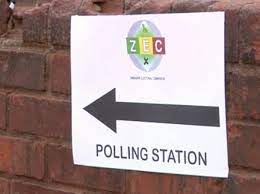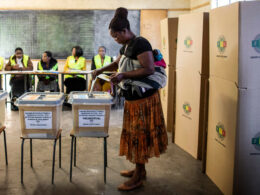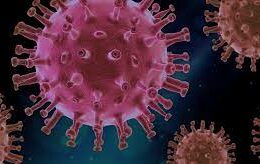As of 28 June 2022, the Government of Zimbabwe said there is no case of monkeypox reported.
The country has however put surveillance, laboratory testing, and case management measures in place in preparation for any potential outbreak.
“The public is urged to put emphasis on implementation of Public Health and Social Measures that are currently being used for Covid-19 such as regular washing of hands and social distancing, these measures have been proven to also work for monkeypox,” said Minister of Information, Publicity and Broadcasting Services, Monica Mutsvanga.
The Minister also said the Risk Communication Sub-Committee must immediately embark on a monkeypox information dissemination exercise.
The neighbouring country, South Africa has however recorded two monkeypox cases, with no history of travel.
Here are some facts about Monkeypox
The Centre for Disease Control and Prevention says monkeypox is a rare disease caused by infection with the monkeypox virus. Monkeypox virus belongs to the Orthopoxvirus genus in the family Poxviridae. The Orthopoxviral genus also includes variola virus (which causes smallpox), vaccinia virus (used in the smallpox vaccine), and cowpox virus. Monkeypox is not related to chickenpox.
“Monkeypox was first discovered in 1958 when two outbreaks of a pox-like disease occurred in colonies of monkeys kept for research. Despite being named “monkeypox”, the source of the disease remains unknown. However, African rodents and non-human primates (like monkeys) may harbour the virus and infect people,” said CDC.
The first human case of monkeypox was recorded in 1970. Since then, monkeypox has been reported in people in several other central and western African countries. Prior to the 2022 outbreak, nearly all monkeypox cases in people outside of Africa were linked to international travel to countries where the disease commonly occurs, or through imported animals.
In addition, the Health Desk Experts say monkeypox is a disease caused by a virus that is mainly transmitted to humans from animals.
“Diseases that are transferred from animals to humans are called zoonotic disease (or zoonosis). As a result, monkeypox is classified as a viral, zoonotic disease,” said the Health Desk Experts.
Signs and symptoms
Monkeypox is a rare disease caused by infection with the monkeypox virus. Monkeypox virus is part of the same family of viruses as smallpox. Monkeypox symptoms are similar to smallpox symptoms but milder, and monkeypox is rarely fatal. Monkeypox is not related to chickenpox.
Symptoms of monkeypox can include Fever, Headache, Muscle aches and backache, Swollen lymph nodes, Chills, Exhaustion, A rash that can look like pimples or blisters that appear on the face, inside the mouth, and on other parts of the body, like the hands, feet, chest, genitals, or anus. The rash goes through different stages before healing completely. The illness typically lasts 2-4 weeks.
How it spreads
CDC said the virus can spread from person to person through: direct contact with the infectious rash, scabs, or body fluids, respiratory secretions during prolonged, face-to-face contact, or during intimate physical contact, such as kissing, cuddling, or sex, touching items (such as clothing or linens) that previously touched the infectious rash or body fluids, pregnant people can spread the virus to their fetus through the placenta. It is also possible for people to get monkeypox from infected animals, either by being scratched or bitten by the animal or by preparing or eating meat or using products from an infected animal.
“Monkeypox can spread from the time symptoms start until the rash has fully healed and a fresh layer of skin has formed. The illness typically lasts 2-4 weeks. People who do not have monkeypox symptoms cannot spread the virus to others. At this time, it is not known if monkeypox can spread through semen or vaginal fluids,” said CDC.
Prevention
People can take the following steps to prevent getting monkeypox: Avoid close, skin-to-skin contact with the monkeypox rash.
“Do not touch the rash or scabs of a person with monkeypox. Do not kiss, hug, cuddle or have sex with someone with monkeypox. Do not share eating utensils or cups,” said CDC.
“Do not handle or touch the bedding, towels, or clothing of a sick person. Wash your hands often with soap and water or use an alcohol-based hand sanitizer, especially after contact with sick people.”
They said in Central and West Africa, people should avoid contact with animals that can spread monkeypox virus, usually rodents and primates.
“Also, avoid sick or dead animals, as well as bedding or other materials they have touched.”
According to CDC, a person who is sick with monkeypox should isolate at home. If they have an active rash or other symptoms, they should be in a separate room or area from other family members and pets when possible.
Vaccination
CDC does not recommend widespread vaccination against monkeypox at this time. However, vaccination may be recommended for some people who: Are close personal contact with people with monkeypox, may have been exposed to the virus or may have an increased risk of being exposed to the virus, such as people who perform laboratory testing to diagnose monkeypox
Treatment
There are no treatments specifically for monkeypox virus infections. However, monkeypox and smallpox viruses are genetically similar, which means that antiviral drugs and vaccines developed to protect against smallpox may be used to prevent and treat monkeypox virus infections.
“Antivirals, such as tecovirimat (TPOXX), may be recommended for people who are more likely to get severely ill, like patients with weakened immune systems. If you have symptoms of monkeypox, you should talk to your healthcare provider, even if you don’t think you had contact with someone who has monkeypox,” said CDC.








